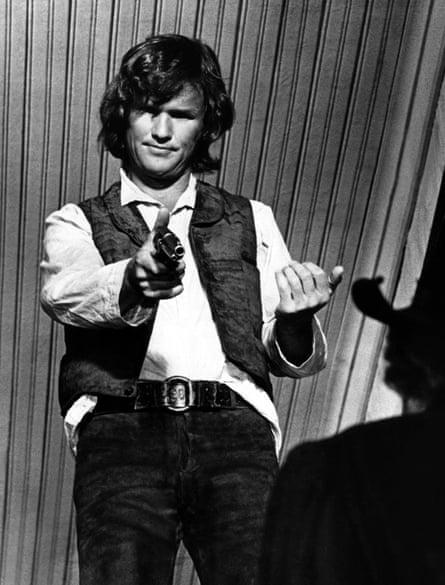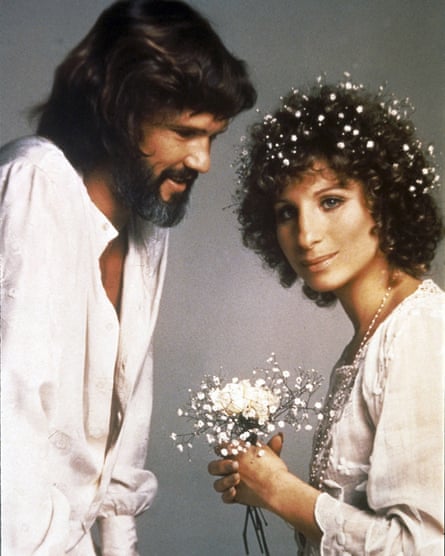‘Songwriter” might be the first term that springs to mind to describe Kris Kristofferson, who has died aged 88, but he could also lay claim to being a singer, film star, soldier and academic. Highly cerebral yet also a rugged man of action, Kristofferson was from the same fine tradition of robust American individualists as his friends Johnny Cash and Sam Peckinpah.
Kristofferson’s greatest successes as a singer-songwriter came during the 1970s, especially with the albums The Silver Tongued Devil and I (1971), Border Lord (1972) and Jesus Was a Capricorn (1972), all big country hits that also crossed over to the pop album charts. However, before he achieved recognition as a performer, Kristofferson was already renowned as a supplier of hit songs to other artists.
His first to chart was Vietnam Blues, recorded by Dave Dudley in 1966, but the ball really started rolling when Roger Miller recorded three Kristofferson songs for his album Roger Miller (1969). One of them was Me and Bobby McGee, the bittersweet story of a pair of lovers and their life on the road, and Miller took it into the country music Top 20. Partly inspired by the Federico Fellini film La Strada (1954), it would become one of Kristofferson’s most covered songs.

Then Ray Stevens charted with Sunday Mornin’ Comin’ Down, the desolate alcoholic’s lament that would be a hit for Cash the following year, Faron Young took Your Time’s Comin’ into the country Top 5, and Jerry Lee Lewis followed suit with Once More With Feeling.
The Kristofferson magic also worked for Ray Price, who took For the Good Times to a country No 1 and the pop Top 20 in 1970, while Sammi Smith scored a pop Top 10 hit with Help Me Make It Through the Night. By the time Janis Joplin’s cover of Me and Bobby McGee topped the pop charts in March 1971, several months after Joplin’s death, Kristofferson (who had had a brief affair with the troubled singer) had become one of the hottest songwriting names in Nashville.
His debut album, Kristofferson, had gone nowhere following its April 1970 release, even though it contained songs being made into hits by other singers, and despite Kristofferson’s appearance at the vast Isle of Wight festival that year. But after he turned the corner commercially with Silver Tongued Devil, the first album was reissued as Me and Bobby McGee – and earned him a gold record. In 1972, several of his songs were nominated for Grammys, and he won Best Country Song for Help Me Make It Through the Night.
By the time Jesus Was a Capricorn had topped the country charts in 1973, boosted by the crossover hit single Why Me, Kristofferson’s attention had turned towards acting. He had already appeared in Dennis Hopper’s chaotic The Last Movie (1971) and played a down-and-out musician in Cisco Pike (1972), and now it was his connection with Peckinpah that pushed his movie career into high gear.
Peckinpah cast him as Billy the Kid in Pat Garrett and Billy the Kid (1973), in which Bob Dylan had an acting role and supplied songs for the soundtrack, and he worked with Peckinpah again on Bring Me the Head of Alfredo Garcia (1974) and Convoy (1978).
In 1973 Kristofferson married the singer Rita Coolidge (his second wife) and the couple scored a big pop and country hit with their first duet album, Full Moon, which delivered a batch of hit singles including the Grammy-winning From the Bottle to the Bottom. They enjoyed further success with the albums Breakaway (1974) and Natural Act (1978).
Meanwhile, Kristofferson had starred in Martin Scorsese’s first Hollywood studio production, the romantic comedy Alice Doesn’t Live Here Anymore (1974), with Ellen Burstyn. Two years later he soared into blockbuster heaven when paired with Barbra Streisand in the remake of A Star Is Born (their on-screen relationship continued off-screen). It was bludgeoned by critics but earned $150m at the box office, and brought Kristofferson a Golden Globe for best actor.

Coolidge and Kristofferson divorced in 1980. Coolidge commented acidly: “I can’t say enough about what a great man he was. It’s just that he was a shitty husband ... He was a very toxic human being with all his drinking and his womanising.”
Kristofferson, discussing how he had idolised the country singer Hank Williams, commented that “most of the heroes in that vein have been pretty self-destructive, and I was myself for a while. I used to drink a lot just to get up on the stage. I did not have a lot of confidence at the beginning.” He stopped drinking alcohol in 1980, after his doctor warned him that he was killing himself.
His leading role as Jim Averill in Heaven’s Gate (1980) ought to have been a crowning triumph for Kristofferson, but Michael Cimino’s portentous western became a byword for wastefulness and excess, and bankrupted United Artists studios. He enjoyed only modest success with Flashpoint (1984) and co-starred the same year with Willie Nelson in Songwriter, for which he wrote several songs, winning an Academy Award nomination for original music score. He and Nelson released the successful duo album Music from Songwriter.
During the 90s he experienced a revival after appearing as a corrupt sheriff in John Sayles’s Lone Star (1996). This led to parts in a string of successful big-budget films including Payback (1999), Planet of the Apes (2001) and the Blade trilogy (1998, 2002 and 2004).
Kristofferson was born in the city of Brownsville, Texas. He was the eldest of three children of Mary Ann Ashbrook and Lars Kristofferson, an air force pilot who rose to the rank of major general. The military life took the family to California, where Kris graduated from San Mateo high school in 1954, then studied creative writing at Pomona College.
He won first prize in a short story competition sponsored by the literary magazine the Atlantic Monthly, and was also recognised by Sports Illustrated for his many achievements in football and athletics during his time as a student.
Later, he was awarded a Rhodes scholarship to Merton College, Oxford University, and it was in the UK that he began performing his own songs. He fell into the orbit of the “beat svengali” Larry Parnes, who secured him some recording sessions (under the name Kris Carson) with Top Rank records and the producer Tony Hatch.
Fortunately, perhaps, Parnes failed to turn him into the next Tommy Steele, and after receiving his master’s degree in English literature in 1960 – he also won a boxing blue while at Oxford – Kristofferson returned to the US.
It was not long before he was back in Europe. Having married Fran Beer in 1960, he joined the US army, became a helicopter pilot and was assigned to West Germany. He continued to write and perform music, forming a band with some fellow servicemen. One of his comrades was a cousin of the Nashville songwriter Marijohn Wilkin, who gave Kristofferson’s work a favourable report when he sent her some of his songs. After completing his tour of duty in 1965 with the rank of captain, he was offered a post at West Point military academy as an English instructor.
However, he took a trip to the city of Nashville to visit Wilkin, which persuaded him to quit the army and devote his efforts to becoming a country music songwriter. He earned a small stipend from a deal with Wilkin’s music publishing company, Buckhorn Music, and worked at various jobs, including flying helicopters to oil rigs in the Gulf of Mexico and taking on a job as a studio janitor.
He was working at Columbia Records’ Nashville studios when Dylan came to town to record his album Blonde on Blonde (1966), and it was here that Kristofferson first met Cash, who would become a staunch friend and supporter.
“John would tell everybody in town that Mickey Newbury and I were the best songwriters around,” Kristofferson remembered. “For me, to be endorsed by someone like Cash was really something, like being endorsed by Dylan.”
Kristofferson’s increasingly left-leaning political sympathies were expressed in his album Repossessed (1987), which gave him a hit single with They Killed Him (a tribute to Gandhi, Christ and Martin Luther King), and he appeared in the television miniseries Amerika (1987), which portrayed a US under communist domination. Another politically slanted album, Third World Warrior (1990), failed to chart.
In 1985, Kristofferson and Nelson banded together with Cash and Waylon Jennings to record Highwayman, and both the album and title song were popular country chart-toppers. This gathering of charismatic and much loved country greats became known as the Highwaymen, and enjoyed further success both as a touring act and with the albums Highwaymen 2 (1990) and The Road Goes on Forever (1995).
Kristofferson completed a hat-trick of albums with the producer Don Was, This Old Road (2006), Closer to the Bone (2009) and Feeling Mortal (2013). His final studio album was The Cedar Creek Sessions (2016), which was nominated for a Grammy award for best Americana album.

After several years of suffering from memory loss that doctors believed was caused by Alzheimer’s disease, in February 2016 Kristofferson at last received a diagnosis of Lyme disease. Following appropriate treatment, his condition improved markedly. “It’s like Lazarus coming out of the grave and being born again,” commented his friend the Nashville singer-songwriter Chris Gantry.
In November 2018, he performed Joni Mitchell’s A Case of You at Both Sides Now – Joni 75: A Birthday Celebration, which marked Mitchell’s 75th birthday. He gave his final full-scale live performance at the Sunrise theatre in the city of Fort Pierce, Florida, in 2020.
Having previously been inducted into the Nashville Songwriters Hall of Fame (1977) and the Songwriters Hall of Fame (1985), he was embraced by the Country Music Hall of Fame in 2004, and in 2006 won the Johnny Mercer award from the Songwriters Hall of Fame.
He once said that he wanted the first three lines of Leonard Cohen’s Bird on the Wire on his tombstone:
Like a bird on the wire
Like a drunk in a midnight choir
I have tried in my way to be free
He is survived by his third wife, Lisa Meyers, whom he married in 1983, and their daughter, Kelly Marie, and sons, Jesse, Jody, Johnny and Blake; by a daughter, Casey, from his second marriage; and by a daughter, Tracy, and a son, Kris, from his first marriage, which ended in divorce.
Kristoffer Kristofferson, songwriter, singer and actor, born 22 June 1936; died 28 September 2024

Comments (…)
Sign in or create your Guardian account to join the discussion